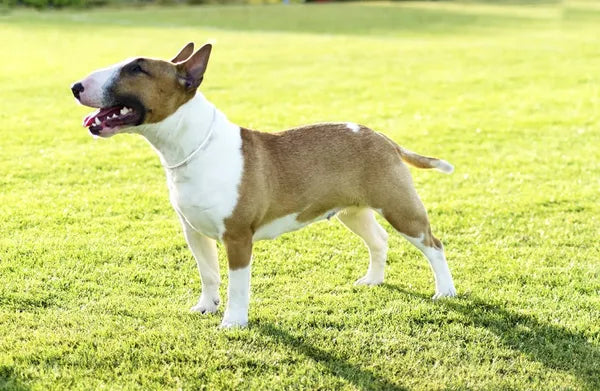Breed Info Summary
Breed Suits: families with children, active lifestyle, companionship
Shedding/Non-Shedding: Low to Moderate
Size: Medium
Origin
Bull Terriers have their origins in England. They were developed in the 19th century through the crossbreeding of Bulldogs and various terrier breeds, including the now-extinct White English Terrier. The breed was initially created for dog fighting and vermin control, but later evolved into a more companionable and show-oriented dog. They were recognized as a distinct breed in 1887 by the Kennel Club in the United Kingdom. Bull Terriers have since gained popularity as both show dogs and beloved family pets.
Personality
The Bull Terrier is a breed known for its distinct personality and unique character. With their egg-shaped head and muscular build, Bull Terriers exude a charming and sometimes mischievous appearance. In terms of temperament, they are often described as playful, energetic, and full of zest for life. These dogs have a boundless enthusiasm for play and enjoy engaging in activities that challenge their physical and mental abilities.
Bull Terriers are also incredibly affectionate and loyal to their human companions. They form strong bonds with their families and thrive on being involved in their daily lives. Their loyalty knows no bounds, and they are often protective of their loved ones. However, it's important to note that Bull Terriers can be strong-willed and independent, which requires consistent and firm training to establish boundaries and ensure good behaviour.
Their spirited nature and inherent intelligence make them quick learners, although their stubborn streak may sometimes pose training challenges. Proper socialization from an early age is crucial to help them develop good manners and interact positively with other animals and people. With the right guidance, Bull Terriers can grow into well-rounded, loving, and entertaining companions that bring joy and laughter to their families.
Pros and cons to consider
Pros
- Playful and Energetic companionship
- Affectionate and loyal towards their owners
- Unique appearance and quirky personality
Cons
- High exercise and mental stimulation needs
- Stubbornness and potential training challenges
- Possibility of aggression or dominance issues with proper socialisation and training


